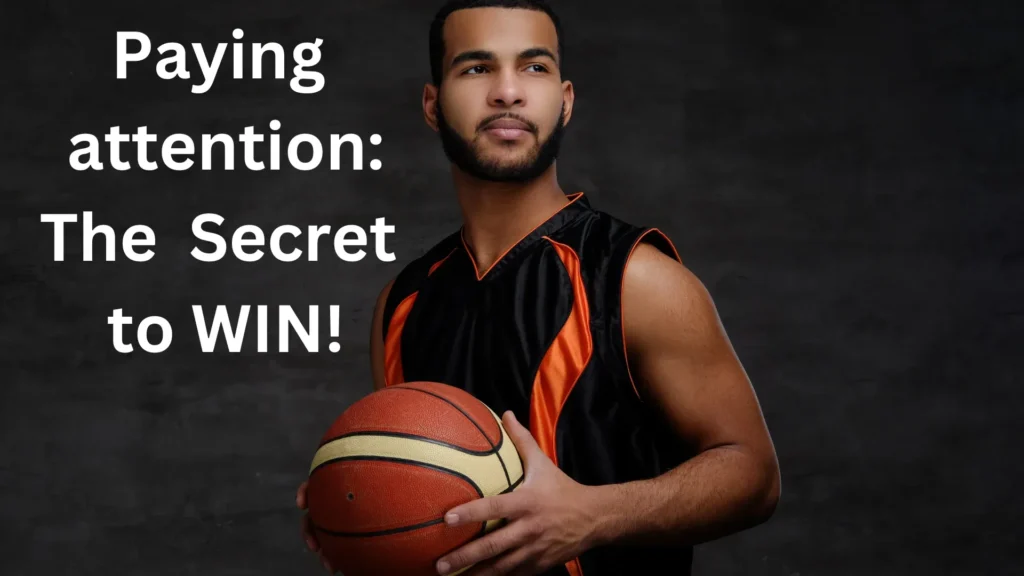
Today we’re talking about paying attention: What it means when you do do, and most importantly: What it means when you don’t and how to refocus quickly.
Ever found yourself zoning out in the middle of a game, or maybe you’ve missed that crucial shot because your mind was on that pizza you’re planning to demolish later?
Hey, no judgment here.
We’ve all been there.
Let’s dive into the world of attention, but let’s keep it chill – imagine we’re just chatting over some coffee, or better yet, a protein shake if that’s more your vibe.
What is Attention?
Attention, in the simplest terms, is like your mind’s spotlight.
It’s what you decide to shine that light on at any given moment.
Think of it as your brain’s super selective filter that decides what’s worth your time and energy.
In sports, it’s what helps you block out the noise of the crowd, the pressure, or even that nagging thought of the after-game meal, focusing instead on the ball, the goal, or your next move.
Think of attention as your brain’s very own DJ, constantly remixing what you focus on based on what’s happening around you.
It’s this incredible ability to decide which tunes (or thoughts, in this case) get the spotlight and which ones are turned down low.
Now, this DJ has a few different playlists, or types of attention, to choose from:
Selective attention
This is when you’re zeroing in on one thing so hard that everything else fades away.
Imagine you’re at the free-throw line, and the only thing that exists in your universe is you, the ball, and the hoop.
The rest of the world?
Muted!
Divided attention
Ever tried rubbing your belly and patting your head at the same time?
That’s your divided attention at work.
It’s the multitasking mode, where you’re splitting your spotlight between different tasks.
Handy, but tricky!
Sustained attention
This one’s all about the long haul.
It’s your ability to keep the focus going over a period of time, like staying locked in during a marathon or a long match.
Executive attention
Think of this as the boss of your attention.
It’s what helps you manage where your focus goes, especially when you’re dealing with complex tasks or unexpected changes during a game.
So, when we talk about paying attention in sports (or in life, for that matter), we’re really talking about a mixtape of these different types. All working together to help you tune in to what matters most at any given moment.
It’s like having your own personal sound engineer inside your head, constantly adjusting the levels to make sure you’re always listening to the right tracks at the right time.
Pretty cool, right?
Why is Attention Important?
Imagine trying to nail a free throw with your eyes closed.
Sounds nuts, right?
That’s because your attention is what guides your precision, decision-making, and ultimately, your performance.
It’s the secret sauce to getting in ‘the zone,’ where everything else fades away, and it’s just you and the game.
This magical zone is where you perform your best, making attention the MVP of mental skills in sports.
To put it bluntly, attention is the gatekeeper of your mental and physical performance.
It’s what helps you absorb the right cues, make split-second decisions, and execute your skills with precision.
Without it, you’re basically shooting in the dark.
Here’s the kicker: attention influences everything from your motivation to your ability to learn and improve.
When you’re fully engaged, you’re not just more likely to perform well. You’re also more likely to enjoy what you’re doing and stick with it.
This is key because let’s face it, sports are as much about resilience and joy as they are about talent and hard work.
But attention doesn’t just affect your individual performance.
It’s a team player too.
In team sports, being attentive means you’re more in sync with your teammates.
You catch the subtle signals, anticipate their moves, and support them better.
It’s about being present, not just for you but for your squad.
So, why is attention so crucial?
Because it’s the bedrock of your mental game.
Sharpening your attention can elevate your performance, enhance your enjoyment, and deepen your connection to your sport.
It’s not just about focusing harder.
It’s about focusing smarter!
Reasons Why We Might Struggle with Paying Attention
So, why do we sometimes feel like our attention span is shorter than a commercial break?
A few culprits include:
- Information overload:
Our brains are like browsers with too many tabs open.
From social media to life’s worries, it’s a clutter fest in there.
- Stress and anxiety:
These guys are like the party crashers of your mental game, making it hard to keep your mind in one place.
- Boredom:
Sometimes, we’re just not that into what we’re doing, and our attention decides to take a little vacation.
- Fatigue:
This is a biggie.
When we’re tired, our ability to focus takes a nosedive.
Whether it’s physical exhaustion from pushing your body to the limits or mental fatigue from stress and overthinking, being tired makes it tough to keep that spotlight steady.
- Overstimulation:
We live in a world that’s constantly vying for our attention.
Flashy ads, social media notifications, the latest news – it’s like being in a crowded room where everyone is talking at you.
This constant barrage can desensitize us to what deserves our focus, making it harder to tune into the task at hand.
- Lack of practice:
Just like any skill, focusing requires practice.
In our multitasking, always-connected world, we often don’t practice concentrating on one thing at a time.
Without practice, our attention span can start to feel as short as that goldfish myth (which, by the way, goldfish might actually have us beat).
- Emotional disturbances:
Ever tried to focus when you’re upset, angry, or super excited?
Emotions can hijack our attention, pulling it away from what we’re supposed to be doing and towards whatever’s fueling our feelings.
This emotional tug-of-war can be a major distraction.
- Lack of interest or motivation: Let’s be honest, we’re more likely to pay attention to things we care about.
If we’re not interested in what we’re doing or if we don’t see the value in it, our attention is going to wander.
This is especially true in sports if we’re not passionate about the game or if we’re just going through the motions.
- Poor health and nutrition: Our brains need the right fuel to function at their best.
Poor diet, dehydration, and lack of essential nutrients can impair cognitive functions, including our ability to focus.
Think of your brain like an athlete; it needs proper nutrition to perform.
What Happens When We Don’t Focus Our Attention?
Losing focus is like trying to play darts in the dark.
When your attention wanders, your performance takes a hit.
Mistakes creep in, reaction times slow down, and before you know it, you’re missing opportunities left and right.
In team sports, this can also mess with the vibe of the whole squad.
It’s a slippery slope from a moment of distraction to a full-on performance dip.
Not focusing can feel like trying to navigate a maze blindfolded.
You might bump into walls, backtrack unintentionally, and take way longer to find the exit—if you find it at all.
Here’s a deeper look at the chaos that ensues when our attention checks out:
Performance Plummets
This is a no-brainer (pun intended).
When you can’t focus, your performance in sports isn’t just slightly off.
It can tank!
You might miss critical cues, forget plays, or make uncharacteristic errors.
It’s like your body’s ready to go, but your brain’s still in the locker room.
Learning and Improvement Stall
Attention is crucial for learning new skills and refining existing ones.
If you’re not paying attention, you’re not absorbing the feedback or noticing the subtle adjustments you need to make.
This means you could be stuck making the same mistakes or plateauing in your progress.
Increased Risk of Injury
This is a big deal, especially in sports.
A lapse in attention can lead to accidents and injuries.
Whether it’s failing to notice a hazard on the field or missing a safety cue in the gym, not paying attention can literally hurt.
Frustration and Negative Emotions
Ever felt the irritation of making a mistake you know you could’ve avoided if you’d just been paying more attention?
Not focusing can lead to a cycle of frustration, disappointment, and even decreased confidence.
It’s not just about the immediate fallout. It’s how it starts to mess with your head and your heart.
Team Dynamics Suffer
In team sports, not being attentive doesn’t just affect you.
It impacts the whole squad!
It can disrupt the flow of play, lead to misunderstandings, and even cause tension among teammates.
Being present isn’t just a personal responsibility.
It’s a commitment to your team!
Missed Opportunities
Life, much like sports, is full of fleeting opportunities.
A moment of distraction can mean the difference between seizing a chance and missing out.
Whether it’s a gap in the defense or a chance to make a game-changing play, a lack of focus can mean these moments slip right by.
The ripple effects of not focusing our attention can be far-reaching, impacting not just our performance but our overall experience and enjoyment of the sport.
Recognizing the consequences can be a powerful motivator to start training our brains with the same intensity we train our bodies.

How Can We Boost Our Attention: 11 Ways
Alright, time for some game-changing strategies to sharpen that attention of yours:
- Practice mindfulness: This is not just hippie talk.
Mindfulness can train your brain to focus better.
Try starting with short meditation sessions, focusing solely on your breath.
- Set clear goals: Knowing exactly what you want to achieve in training or during a game can help keep your attention locked in.
- Limit distractions: Create an environment that’s conducive to focus.
This might mean turning off your phone during training or creating routines that help minimize other distractions.
- Take breaks: Sometimes, the best way to improve focus is to step away for a moment.
Short breaks can prevent mental fatigue and keep your mind sharp.
- Visualization techniques: Imagine executing the perfect play or shot over and over.
This mental rehearsal can enhance focus when it’s game time.
- Regular Exercise: Physical activity isn’t just good for your body.
It’s also great for your brain.
Regular exercise can improve cognitive function, including attention and memory.
Plus, it’s a great way to burn off excess energy that might otherwise fuel your distractions.
- Nutrition Tweaks: Brain foods can make a difference.
Omega-3 fatty acids found in fish, antioxidants in berries, and even the caffeine in your morning coffee can enhance focus and cognitive function.
Eating a balanced diet fuels both your body and your mind.
- Sleep Hygiene: Never underestimate the power of a good night’s sleep.
Sleep is crucial for cognitive functions, including attention.
Establishing a regular sleep schedule and creating a restful environment can improve your sleep quality and, in turn, your ability to focus.
- Digital Detox: Limiting screen time, especially before bed, can help reduce mental clutter.
Try setting aside specific times to check emails or social media rather than constantly multitasking.
This can help train your brain to focus when it needs to.
- Attention Training Exercises: There are specific exercises and games designed to improve attention and concentration, such as puzzles, memory games, or even certain video games with a cognitive challenge.
These can be a fun way to sharpen your focus.
- Mindful Movement Practices: Activities like yoga or tai chi not only improve physical fitness but also require a high degree of mental focus and discipline, helping to train your attention in a holistic way.
By integrating these strategies into your routine, you can enhance your ability to focus, leading to improved performance, reduced risk of injury, and a greater overall enjoyment of your sport.
Remember, like any skill, improving attention takes practice, patience, and persistence.
Don’t forget the power of fun!
Seriously!
When we enjoy what we’re doing, paying attention comes a lot easier.
For example, incorporating games or challenges into your training that not only work on your skills but also make the grind a bit more enjoyable.
Conclusion
As we wrap up our exploration of attention in the world of sports, it’s clear that mastering our focus is less about wrestling with distractions and more about nurturing the habits and environments that enhance our natural abilities to concentrate.
It’s a journey that goes beyond the field or court, extending into our daily routines, our physical health, and even our digital habits.
Therefore, embracing this journey can transform not only how we perform but also how we enjoy our sports and, by extension, our lives.
For those looking to take their game to the next level, remember you’re not alone.
The Success Stories Community offers a unique blend of professional support and camaraderie.
As a sports psychologist, I’m here to guide you through the mental challenges and hurdles of attention and focus, providing personalized strategies and insights.
But it’s more than just one-on-one support. It’s about being part of a community of like-minded individuals, all striving for peak performance.
Within this community, you’ll find a wealth of resources, from workshops and webinars to interactive discussions, all designed to help you sharpen your focus and achieve your highest potential.
Joining the Success Stories Community means embarking on a path to high performance with a network of support behind you.
Together, we’ll tackle the challenges, celebrate the victories, and continually push the boundaries of what we can achieve, both individually and as a collective.
The journey to mastering attention in sports is a team effort!
And with the right support system and resources, the possibilities are limitless.
Let’s turn those possibilities into your success story!
See you on the inside!



